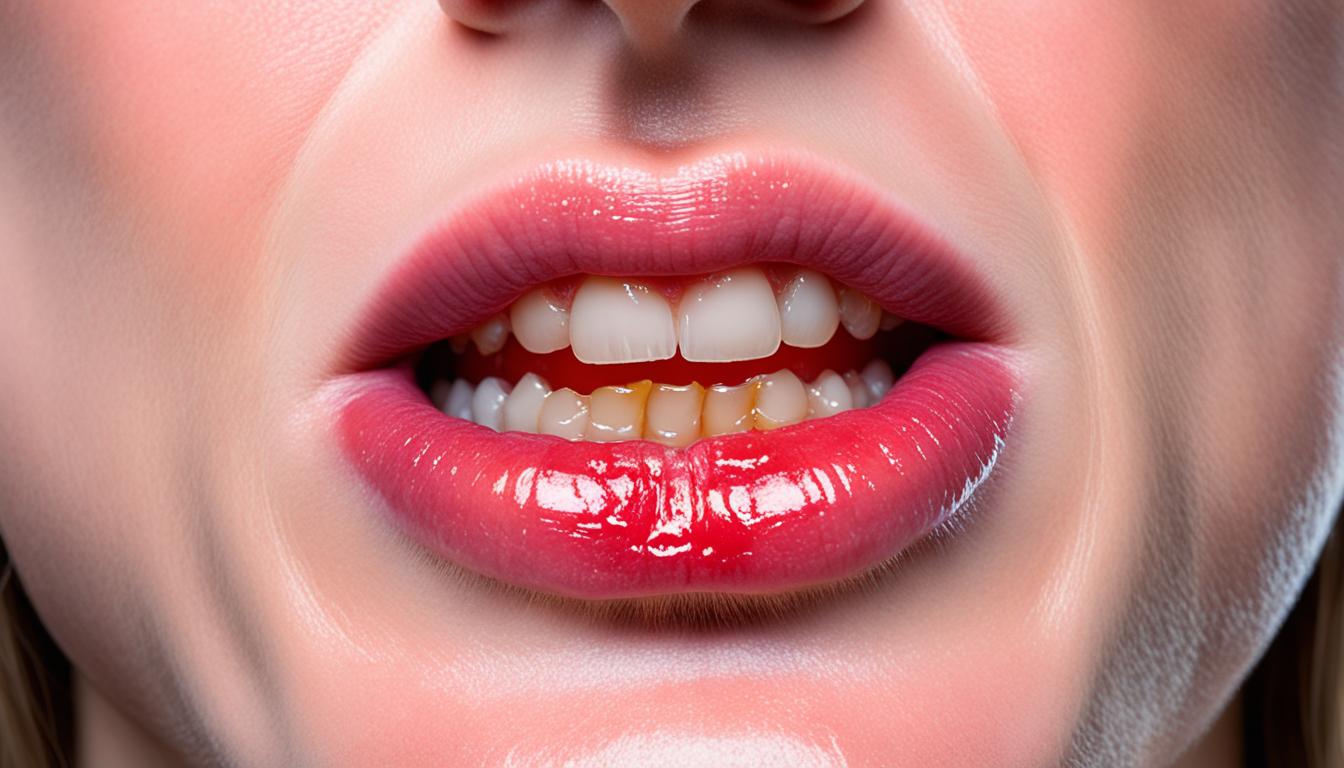Canker sores, or oral ulcers, are painful sores inside the mouth. They make eating and talking hard and can last from a few days to several weeks. Their exact cause is not fully known, but stress, hormonal changes, certain foods, and immune issues might trigger them.
Options for treating canker sores include using creams and rinses to ease pain and swelling. In more severe situations, stem cell therapy may be an option. This therapy helps the sores heal and new tissue grow. Always see a doctor for the best advice and treatment.
Key Takeaways:
- Canker sores are common inflammatory conditions that cause painful sores inside the mouth.
- They can be triggered by factors such as stress, hormonal changes, certain foods, and immune system issues.
- Treatment options include topical medications, mouthwashes, and in severe cases, stem cell therapy.
- Stem cell therapy aims to promote healing and tissue regeneration in the affected area.
- Consulting with a healthcare professional is important for an accurate diagnosis and appropriate treatment plan.
Causes of Canker Sores
The exact causes of canker sores are not fully known. But, some factors have been linked to them. Things like puberty or pregnancy can bump up your canker sore chances. This is because changes in hormones disturb the mouth’s balance, forming sores. Stress is another big player. It can weaken your immune system, opening the door for sores. Eating certain foods like citrus, spices, and nuts may also spark canker sores.
People with immune system problems might get canker sores often. The immune system fights off what causes these sores. But, if it’s not working right, you’re more open to them. More studies are needed to really get why canker sores happen. This would include looking at how hormones, stress, the immune system, and food all mix together.
Common Canker Sore Triggers
| Triggers | Description |
|---|---|
| Hormonal Changes | Puberty and pregnancy can disturb the mouth’s delicate balance, upping the risk of canker sores. |
| Stress | High stress levels weaken your immune system and make you more likely to get ulcers. |
| Certain Foods | Eating things like citrus fruits, spicy foods, and nuts can bother your mouth and lead to sores. |
| Immune System Issues | People with immune system troubles might get canker sores often. Their body can’t easily fight off what causes these ulcers. |
Knowing what might trigger canker sores helps in making life changes to lessen the risk. It’s always smart to talk with a doctor for tips and treatments.
Symptoms and Diagnosis of Canker Sores
Canker sores, or mouth ulcers, have unique signs. They are small, round sores found inside the mouth. These ulcers come in various sizes and are white or yellow. The area around them may look red and swollen, causing pain. You might feel pain while eating or drinking, especially with spicy or acid foods. Some people might also get swollen lymph nodes, have a fever, stomach pain, or even diarrhea.
Diagnosing canker sores is done through a detailed check by a doctor. It’s mainly by looking at the mouth and asking about the patient’s health history. The doctor will look at the ulcers to see their features, like size, color, and where they are. A biopsy might be needed sometimes to make sure it’s not something else.
To sum up, canker sores show as small, white or yellow, painful ulcers. A visit to a doctor is key for correctly identifying them. This allows for the right kind of care and treatment.
Common Symptoms of Canker Sores
| Symptom | Description |
|---|---|
| Small ulcers | Round, shallow sores in the mouth |
| White or yellow color | Ulcers appear as white or yellow spots |
| Pain when eating | Discomfort or pain while consuming food or beverages |
| Swollen lymph nodes | Glands near the affected area may become swollen |
| Fever | Systemic symptom accompanying canker sores |
| Abdominal pain | Pain in the abdomen that may accompany canker sores |
| Diarrhea | Loose, watery stools may occur in some cases |
Treatment and Prevention of Canker Sores
Treating canker sores aims to cut the pain, help them heal, and stop them from coming back. A good way is to use medicines that you put right on the sores. These include gels or ointments that can lower pain and swelling.
Special mouthwashes with steroids or antibiotics can also help. They ease pain and make you feel better. Managing stress through things like calming exercises can lower how often you get canker sores.
To stop canker sores from happening, oral hygiene is crucial. Brushing and flossing regularly keeps your mouth healthy. Also, stay away from foods that might start a sore, like spicy or sour ones.
Seeing a doctor is wise if canker sores keep bothering you. They can offer advice and the best treatments just for you.

